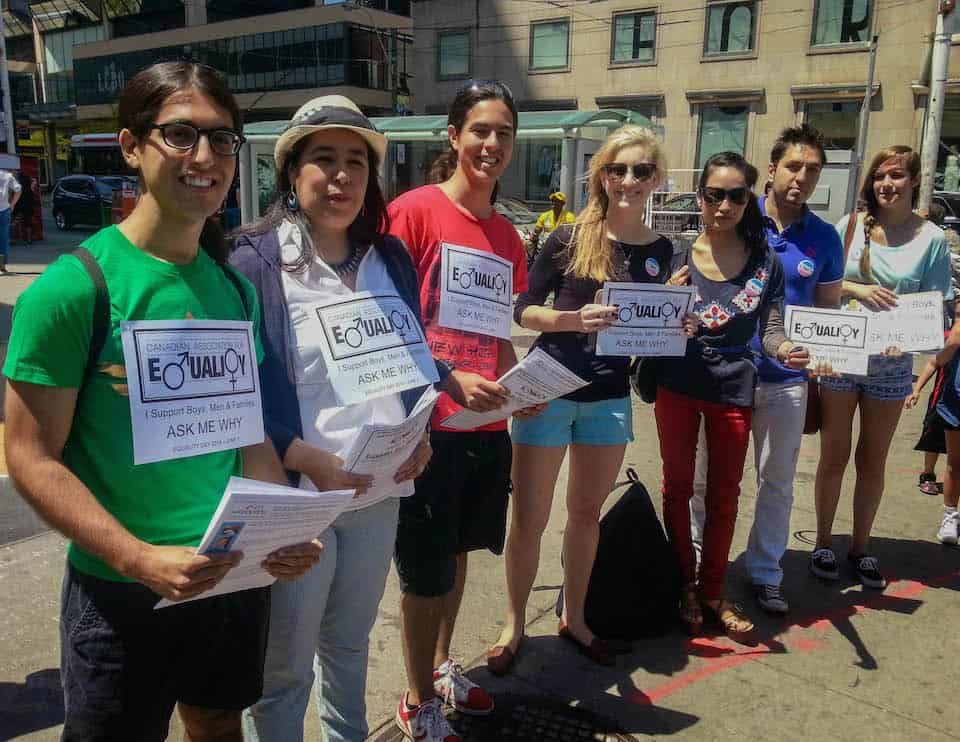The Canadian Association for Equality (CAFE) — a men’s rights organization — has been banned from the Toronto Pride Parade this coming Sunday.
“We have not been given any substantive reasons and we provided PRIDE with information about CAFE aims and methods, as well as refutation of the claims raised by the complainants,” said Eleanor Levine, who provides pro-bono counselling for CAFE, in a statement sent to The Varsity.
In the past, media and critics have publicly denounced CAFE for being a misogynistic and anti-feminist organization.
Nathan Gibson, drop-in center director of LGBTOUT, a University of Toronto LGBTQ+ equity group, praised Toronto Pride’s decision. “I have a lot of opinions but basically I don’t agree at all with CAFE or [men’s rights activist] groups in general and I think it’s absolutely great that they were banned from this year’s Pride Parade,” he said.
Dispute Resolution Process
Pride Toronto said that they received several complaints regarding CAFE’s application to participate in this year’s Toronto Pride Parade. After CAFE’s application was reviewed under the Pride Toronto Dispute Resolution Process (DRP), it was declined. CAFE will also not be able to participate in any future parades or events organized by Pride Toronto.
The DRP reviews and resolves complaints regarding inclusion or exclusion from the Toronto Pride Parade. The directors of Pride Toronto appoint a third party arbitrator for the DRP.
“I must give the complaints of members of the LGBTTIQQ2SA community precedence when they indicate the participation of CAFE could directly undermine the participation of queer, lesbian and trans women in the Pride Parade. Consequently, I determined that the Pride Parade is not the right venue for CAFE, given Pride Toronto’s vision to create a safe space for people of all genders and sexual orientation,” said Paul Bent regarding his decision to ban CAFE.
“I would say [Pride’s decision] was more political than anything,” said Edward Sullivan, a member of CAFE’s Board of Directors.
Sullivan also took issue with the DRP process. “Most troubling to us is that Toronto Pride’s arbiter did not appear to have done anything to examine the accuracy of the complaints, despite the fact that many (if not most) of them contained serious and verifiable factual errors.”
Historical disputes
This is not the first time that CAFE has had issues with Pride Toronto. Last year, CAFE’s permit to march in the Pride Parade was revoked the week of the parade, citing that the organization may “contravene the spirit of the mission, vision, and values of Pride Toronto and WorldPride.”
“As a member of the LGBT community myself, I find it very difficult to believe that the complaints I read through reflect the views of the community (they certainly didn’t reflect the views of most people I know),” said Sullivan.
“I rather doubt that CAFE’s participation would cause more discomfort than, for example, organizations representing religions that have historically persecuted people for their sexuality,” he added.
CAFE and feminism
CAFE does not regard themselves to be a men’s rights organization. It is laid out in the group’s mandate that, although they are interested in the equality of all genders, they have a focus on the status, health, and well-being of boys and men.
CAFE’s mandate also states that they advocate against “academic misandry,” which their website clarifies as the studying of women and gender studies and cultural programs. They also oppose legal biases against men, hatred, and contempt for men, while calling for fathers’ rights, and men’s health.
They do not call themselves a men’s rights group because they believe that, discrimination against men also adversely affects many women including the daughters, mothers, sisters, partners, and friends of male victims.
Gibson expressed that men do face specific issues, but that feminism is the way to combat those. “Men are negatively affected by typical gender roles and are not allowed to express themselves because of them; feminism is trying to stop that.”
“The shaming of ‘femmes’ is a feminist issue because ‘feminine’ qualities are seen as lesser,” Gibson said, giving an example to illustrate the patriarchy at work. “It is SO much harder for trans-women than trans-men (though obviously both have it tough) because of transmisogyny and misogyny,” he said.
“I think it’s absolutely abhorrent that these people claim to be fighting for equality when in fact they are working to undermine it and take down feminism, which is a movement that helps men in SO MANY ways,” Gibson stated.
“Our experience suggests that there are some women (and men) who self identify as feminist and who feel that men and women are in competition, that freedom and equality is a zero-sum game. Hence, in their view addressing men’s issues detracts from women’s causes. It is not clear what proportion of feminists this group represents,” said Levine, regarding feminism.
Levine said that she supports fair treatment, fair wages and equal opportunity for women and men, although she did not refer to herself as a feminist.
“There is a lot of help for women,” said Levine, referring to the number of shelters, telephone lines, and services that specify women as the group that they serve.
CAFE was able to march in the York region pride parade this past weekend. The York Region Pride coordinator said that he did not receive complaints about the group.
The U of T Men’s Issues Awareness Society, which is affiliated with CAFE, did not respond to a request for comment.


